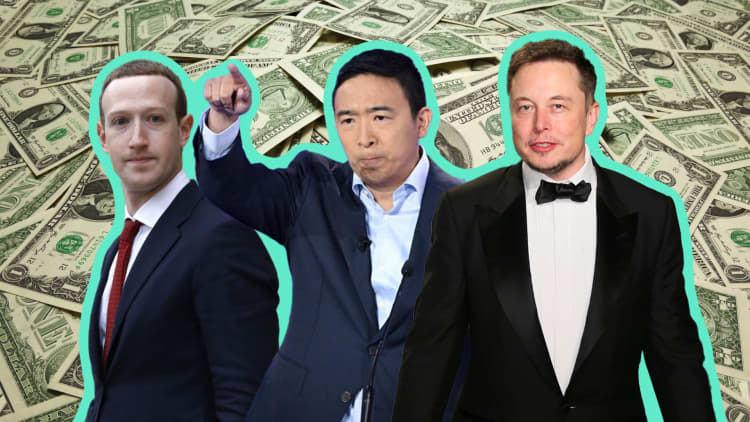The coronavirus crisis has revitalized calls for a universal basic income, with even the Pope suggesting that now may be the time to consider giving everyone free money.
The Covid-19 outbreak has meant countries across the globe have effectively had to shut down, with many governments imposing draconian measures on the lives of billions of people.
The social, educational and economic ramifications of the confinement measures, which vary in their application worldwide but broadly include social distancing, school closures and bans on public gatherings, are expected to have a profoundly negative impact.
To be sure, the International Monetary Fund now expects the global economy in 2020 to suffer its worst financial crisis since the Great Depression.
The dramatic downgrade to this year's growth expectations has amplified concern about those most vulnerable to an economic slump. In his Easter letter over the weekend, Pope Francis said: "This may be the time to consider a universal basic wage."
He argued it would "ensure and concretely achieve the ideal, at once so human and so Christian, of no worker without rights."
As of Thursday, more than 2 million people had contracted Covid-19 worldwide, with 137,666 deaths, according to data compiled by Johns Hopkins University.
'We have got to protect everyone'
Universal basic income is not a new idea. But it has gained more traction of late, more recently through the likes of U.S. presidential candidate Andrew Yang, who based his platform on the policy.
The IMF describes universal basic income as an income support mechanism, in which regular cash payments are intended to reach all (or a very large) portion of the population with no (or minimal) conditions.
Guy Standing, a research professor in development studies at SOAS, University of London, told CNBC via telephone that there was no prospect of a global economic revival without a universal basic income.
Standing, who has been an advocate for a universal basic income for more than three decades, said he believed the coronavirus crisis would be "the trigger" for a basic wage.
"It's almost a no-brainer," he said. "We are going to have some sort of basic income system sooner or later, but I think getting the establishments of many countries to do it is like pulling the proverbial tooth. There's a big institutional resistance to it because of the implications of moving in this direction."

Standing urged world leaders and policymakers to avoid repeating the same mistakes that were made in the aftermath of the 2008 global financial crisis, saying another "toxic combination" of austerity and quantitative easing would simply stoke up another crisis.
"Going back and doing what they did after 2008 would be a disaster."
Some governments, including the U.K., Austria and Denmark, have introduced wage subsidies in an effort to protect households from an expected economic downturn. They are intended to help protect jobs and cover the salaries of millions of people.
Standing dismissed such an approach as "regressive" and "inefficient," arguing wage subsidies of this nature would only ever result in a large number of vulnerable people being excluded from the system. "It's atrocious economics."
"So, for me, all of the arguments are tilting us toward saying: 'We've got to protect everybody. We are all vulnerable.'"
'A level unifier'
Earlier this month, Spain's Minister for Economic Affairs Nadia Calvino told Spanish broadcaster La Sexta that the euro zone's fourth-largest economy would roll out a universal basic income "as soon as possible."
Calvino said the government's wish was to make a nationwide basic wage a permanent instrument that supports citizens "forever."
If the policy is implemented successfully over the coming weeks, it would make Spain the first country in Europe to introduce a universal basic income on a long-term basis.
Cailin Birch, global economist at the Economist Intelligence Unit, told CNBC via telephone that Spain's decision to roll out a universal basic income could pave the way for other countries to follow suit.
"In the U.S., they've actually already arrived at the policy — albeit through the back door rather than the front door," Birch said, referring to the federal government's direct payments plan.
The first wave of stimulus relief checks were deposited into some Americans' bank accounts over the weekend, according to the IRS. Millions more expect to receive theirs in the coming weeks.
The checks are worth $1,200 for individuals with adjusted gross income below $75,000 and $2,400 for couples earning below $150,000.
It comes as part of the $2.2 trillion stimulus bill passed late last month. The direct payments are designed to help mitigate the financial strain caused by Covid-19.
"If anything, it makes the case for the need to have some kind of level unifier so that households can avoid financial ruin," Birch said.
She warned one-off payments would be an "imperfect example" for basic income in the world's largest economy, given that households would not be able to plan on receiving a second payment and because people are typically hesitant to spend money in the wake of an economic downturn.
There's a "big divide" between the U.S. and Europe when it comes to their appetite for a universal basic wage, Birch said, suggesting Europe was generally seen to have "more familiarity and comfort with a left-leaning view."


